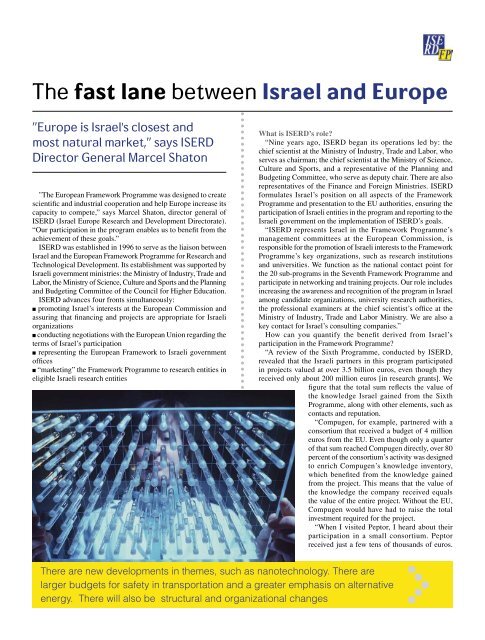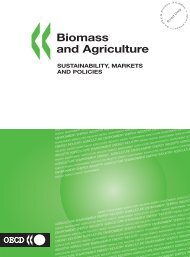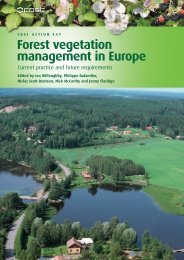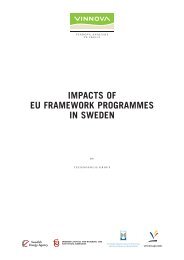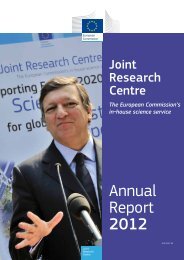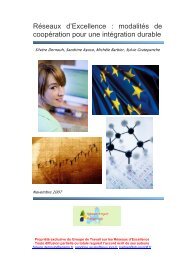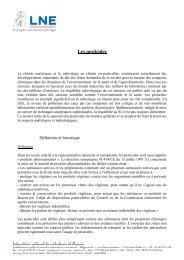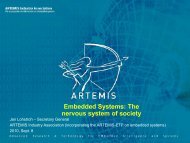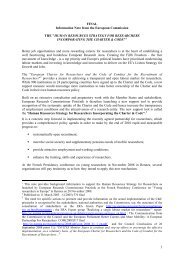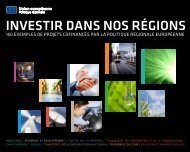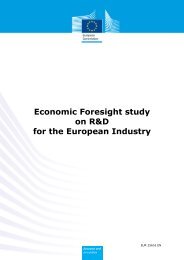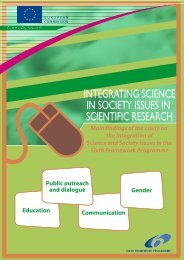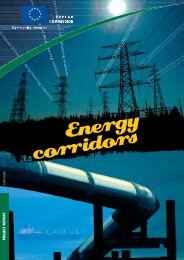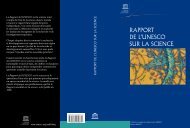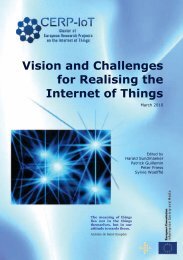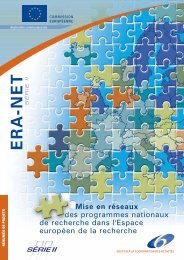Télécharger le document - Eurosfaire
Télécharger le document - Eurosfaire
Télécharger le document - Eurosfaire
Create successful ePaper yourself
Turn your PDF publications into a flip-book with our unique Google optimized e-Paper software.
The fast lane between Israel and Europe<br />
"Europe is Israel’s closest and<br />
most natural market,” says ISERD<br />
Director General Marcel Shaton<br />
"The European Framework Programme was designed to create<br />
scientific and industrial cooperation and help Europe increase its<br />
capacity to compete,” says Marcel Shaton, director general of<br />
ISERD (Israel Europe Research and Development Directorate).<br />
“Our participation in the program enab<strong>le</strong>s us to benefit from the<br />
achievement of these goals.”<br />
ISERD was established in 1996 to serve as the liaison between<br />
Israel and the European Framework Programme for Research and<br />
Technological Development. Its establishment was supported by<br />
Israeli government ministries: the Ministry of Industry, Trade and<br />
Labor, the Ministry of Science, Culture and Sports and the Planning<br />
and Budgeting Committee of the Council for Higher Education.<br />
ISERD advances four fronts simultaneously:<br />
n promoting Israel’s interests at the European Commission and<br />
assuring that financing and projects are appropriate for Israeli<br />
organizations<br />
n conducting negotiations with the European Union regarding the<br />
terms of Israel’s participation<br />
n representing the European Framework to Israeli government<br />
offices<br />
n “marketing” the Framework Programme to research entities in<br />
eligib<strong>le</strong> Israeli research entities<br />
What is ISERD’s ro<strong>le</strong>?<br />
“Nine years ago, ISERD began its operations <strong>le</strong>d by: the<br />
chief scientist at the Ministry of Industry, Trade and Labor, who<br />
serves as chairman; the chief scientist at the Ministry of Science,<br />
Culture and Sports, and a representative of the Planning and<br />
Budgeting Committee, who serve as deputy chair. There are also<br />
representatives of the Finance and Foreign Ministries. ISERD<br />
formulates Israel’s position on all aspects of the Framework<br />
Programme and presentation to the EU authorities, ensuring the<br />
participation of Israeli entities in the program and reporting to the<br />
Israeli government on the imp<strong>le</strong>mentation of ISERD’s goals.<br />
“ISERD represents Israel in the Framework Programme’s<br />
management committees at the European Commission, is<br />
responsib<strong>le</strong> for the promotion of Israeli interests to the Framework<br />
Programme’s key organizations, such as research institutions<br />
and universities. We function as the national contact point for<br />
the 20 sub-programs in the Seventh Framework Programme and<br />
participate in networking and training projects. Our ro<strong>le</strong> includes<br />
increasing the awareness and recognition of the program in Israel<br />
among candidate organizations, university research authorities,<br />
the professional examiners at the chief scientist’s office at the<br />
Ministry of Industry, Trade and Labor Ministry. We are also a<br />
key contact for Israel’s consulting companies.”<br />
How can you quantify the benefit derived from Israel’s<br />
participation in the Framework Programme?<br />
“A review of the Sixth Programme, conducted by ISERD,<br />
revea<strong>le</strong>d that the Israeli partners in this program participated<br />
in projects valued at over 3.5 billion euros, even though they<br />
received only about 200 million euros [in research grants]. We<br />
figure that the total sum ref<strong>le</strong>cts the value of<br />
the know<strong>le</strong>dge Israel gained from the Sixth<br />
Programme, along with other e<strong>le</strong>ments, such as<br />
contacts and reputation.<br />
“Compugen, for examp<strong>le</strong>, partnered with a<br />
consortium that received a budget of 4 million<br />
euros from the EU. Even though only a quarter<br />
of that sum reached Compugen directly, over 80<br />
percent of the consortium’s activity was designed<br />
to enrich Compugen’s know<strong>le</strong>dge inventory,<br />
which benefited from the know<strong>le</strong>dge gained<br />
from the project. This means that the value of<br />
the know<strong>le</strong>dge the company received equals<br />
the value of the entire project. Without the EU,<br />
Compugen would have had to raise the total<br />
investment required for the project.<br />
“When I visited Peptor, I heard about their<br />
participation in a small consortium. Peptor<br />
received just a few tens of thousands of euros.<br />
There are new developments in themes, such as nanotechnology. There are<br />
larger budgets for safety in transportation and a greater emphasis on alternative<br />
energy. There will also be structural and organizational changes


